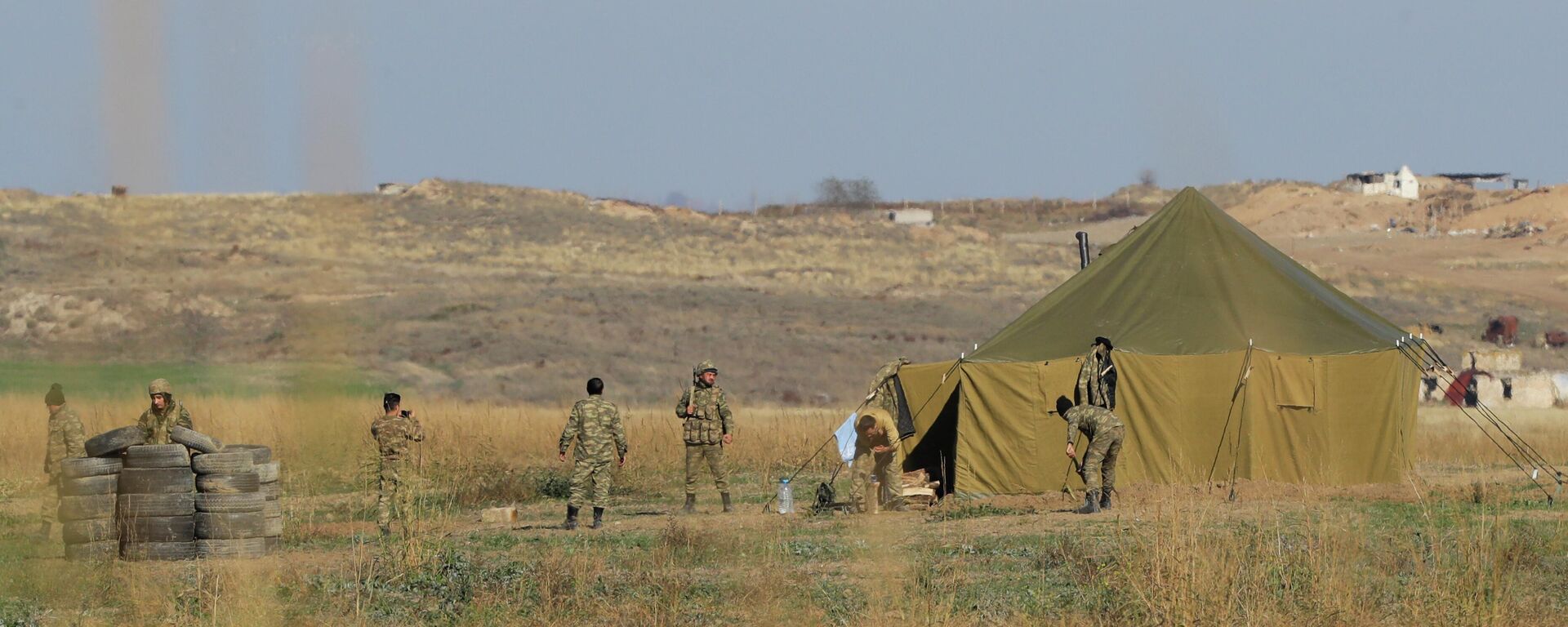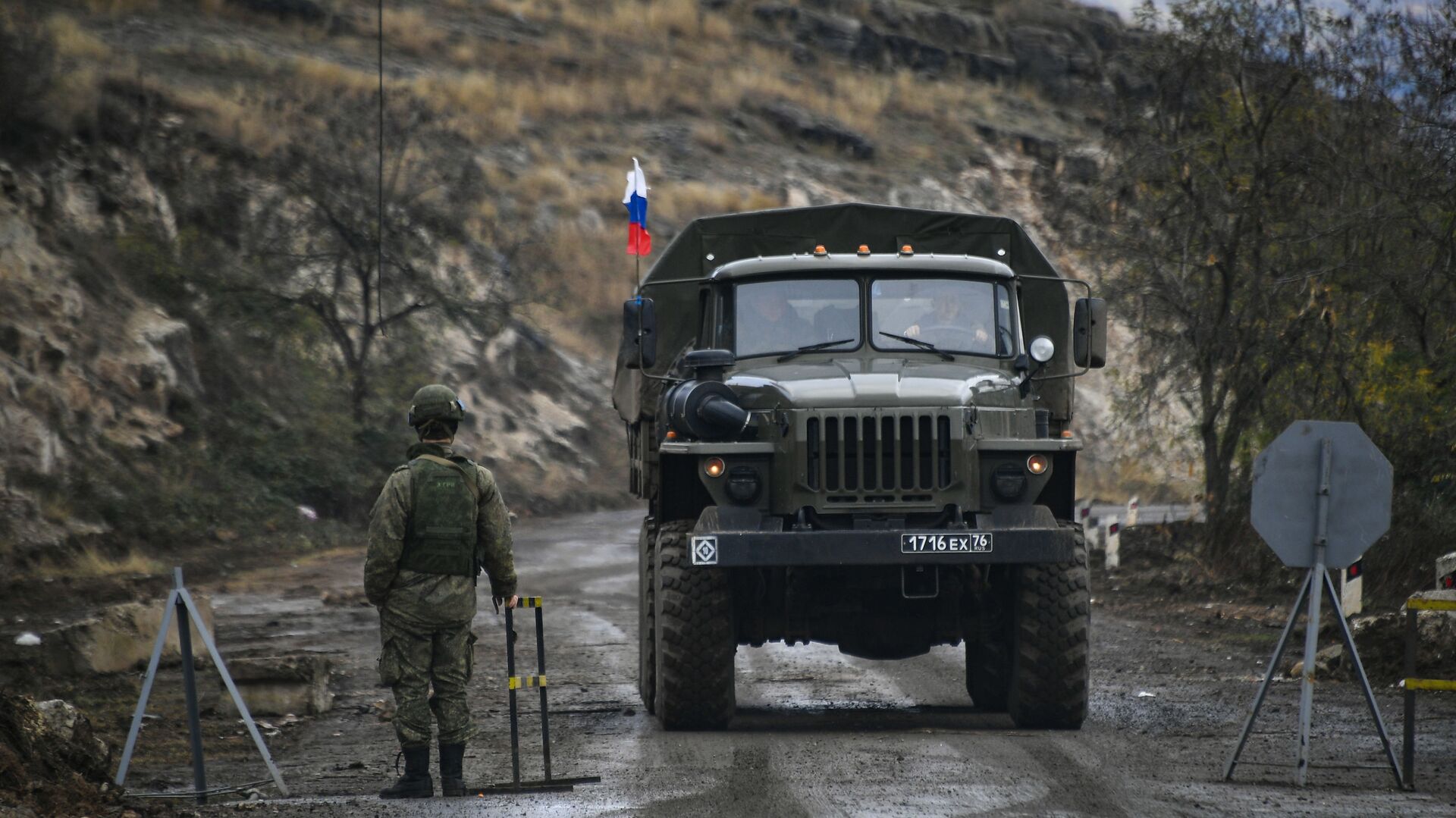https://sputnikglobe.com/20230920/azerbaijan-nagorno-karabakh-agree-on-ceasefire-through-coordination-of-russian-peacekeepers---mod-1113518498.html
Azerbaijan, Nagorno-Karabakh Agree on Ceasefire Through Coordination of Russian Peacekeepers - MoD
Azerbaijan, Nagorno-Karabakh Agree on Ceasefire Through Coordination of Russian Peacekeepers - MoD
Sputnik International
Azerbaijan and representatives of the Armenian population of Nagorno-Karabakh have agreed on a complete cessation of hostilities through the mediation of Russian peacekeepers, the Russian Defense Ministry said on Wednesday.
2023-09-20T10:27+0000
2023-09-20T10:27+0000
2023-09-20T12:33+0000
world
armenia
nikol pashinyan
ilham aliyev
nagorno-karabakh
azerbaijan
yerevan
russian defense ministry
russia
nagorno-karabakh conflict
https://cdn1.img.sputnikglobe.com/img/07e4/0b/1d/1081308300_0:161:3071:1888_1920x0_80_0_0_1c18b070462f0420526187a2e9e35d4b.jpg
Azerbaijan and representatives of the Armenian population of Nagorno-Karabakh have agreed on a complete cessation of hostilities through the mediation of Russian peacekeepers, the Russian Defense Ministry said on Wednesday.The Russian peacekeeping contingent in Nagorno-Karabakh is in contact with both Yerevan and Baku, discussing the prevention of bloodshed in the region, the Russian Defense Ministry said on Wednesday.Russian peacekeepers continue to perform their duties in Nagorno-Karabakh in aggravated conditions, the ministry said, adding that 2,261 civilians, including 1,049 children, are currently located in a base camp of peacekeepers in Nagorno-Karabakh.On Tuesday, Baku announced the launch of "local-level anti-terrorist activities" in Nagorno-Karabakh aimed at "restoring the constitutional order." It also said Azerbaijani forces only targeted military objects in Nagorno-Karabakh, while Armenian state media reported multiple casualties among civilians as a result of Azerbaijani strikes. Yerevan described the operation as aggression and reiterated that it had no military presence in the disputed region.In 1923, the region was granted the status of an autonomous area called the Nagorno-Karabakh Autonomous Oblast (NKAO) within the Azerbaijan Soviet Socialist Republic.In 1988, a movement for reunification with Armenia began in Nagorno-Karabakh. On September 2, 1991, it declared independence from Azerbaijan and changed its name to the Nagorno-Karabakh Republic. From 1992 to 1994, Azerbaijan attempted to regain control over the self-declared republic, resulting in full-scale military hostilities in which up to 30,000 people lost their lives.In 1994, the parties agreed to a ceasefire, but the status of the republic remained undetermined. In late September 2020, hostilities resumed in Nagorno-Karabakh. On the night of November 10, Azerbaijan and Armenia, with Moscow's support, reached a comprehensive ceasefire agreement, maintaining their respective positions and exchanging prisoners of war and the bodies of the deceased. Russian peacekeepers were deployed in the region, including the Lachin Corridor.In 2022 with the mediation of Russia, the United States, and the European Union, Yerevan and Baku began discussing the terms of a future peace agreement. In late May of this year, Armenian Prime Minister Nikol Pashinyan declared that Yerevan was ready to recognize Azerbaijan's sovereignty within its Soviet-era borders, including Karabakh.In September 2023, Russian President Vladimir Putin noted that the Armenian leadership had essentially recognized Azerbaijan's sovereignty over Nagorno-Karabakh. Azerbaijani leader Ilham Aliyev said that Azerbaijan and Armenia could sign a peace agreement by the end of the year if Yerevan did not change its stance.
https://sputnikglobe.com/20230920/azerbaijani-announces-reached-agreement-to-suspend-anti-terrorist-activities-in-nagorno-karabakh-1113517950.html
armenia
nagorno-karabakh
azerbaijan
yerevan
russia
Sputnik International
feedback@sputniknews.com
+74956456601
MIA „Rossiya Segodnya“
2023
Sputnik International
feedback@sputniknews.com
+74956456601
MIA „Rossiya Segodnya“
News
en_EN
Sputnik International
feedback@sputniknews.com
+74956456601
MIA „Rossiya Segodnya“
Sputnik International
feedback@sputniknews.com
+74956456601
MIA „Rossiya Segodnya“
azerbaijan, nagorno-karabakh, cessation of hostilities, russian peacekeepers, russian defense ministry
azerbaijan, nagorno-karabakh, cessation of hostilities, russian peacekeepers, russian defense ministry
Azerbaijan, Nagorno-Karabakh Agree on Ceasefire Through Coordination of Russian Peacekeepers - MoD
10:27 GMT 20.09.2023 (Updated: 12:33 GMT 20.09.2023) MOSCOW (Sputnik) - On September 19, Baku announced the launch of "local-level anti-terrorist activities" in Nagorno-Karabakh aimed at "restoring the constitutional order."
Azerbaijan and representatives of the Armenian population of Nagorno-Karabakh have agreed on a complete cessation of hostilities through the mediation of Russian peacekeepers, the Russian Defense Ministry said on Wednesday.
"Through the mediation of the command of the Russian peacekeeping contingent, an agreement was reached between the Azerbaijani side and representatives of Nagorno-Karabakh on a complete cessation of hostilities. The implementation of these agreements will be carried out in coordination with the command of the Russian peacekeeping contingent," the ministry said in a statement.
The
Russian peacekeeping contingent in Nagorno-Karabakh is in contact with both Yerevan and Baku, discussing the prevention of bloodshed in the region, the Russian Defense Ministry said on Wednesday.
"The command of the Russian peacekeeping contingent is in close contact at the appropriate level with the Azerbaijani and Armenian sides, representatives of Nagorno-Karabakh. The prevention of bloodshed, compliance with the norms of humanitarian law in relation to the civilian population, as well as ensuring the safety of the Russian peacekeeping contingent are discussed," the ministry said in a statement.
Russian peacekeepers continue to perform their duties in Nagorno-Karabakh in aggravated conditions, the ministry said, adding that 2,261 civilians, including 1,049 children, are currently located in a base camp of peacekeepers in Nagorno-Karabakh.
On Tuesday, Baku announced the launch of "local-level anti-terrorist activities" in Nagorno-Karabakh aimed at "restoring the constitutional order." It also said Azerbaijani forces only targeted military objects in Nagorno-Karabakh, while Armenian state media reported multiple casualties among civilians as a result of Azerbaijani strikes. Yerevan described the operation as aggression and reiterated that it had no military presence in the disputed region.

20 September 2023, 09:58 GMT
In 1923, the region was granted the status of an autonomous area called the Nagorno-Karabakh Autonomous Oblast (NKAO) within the Azerbaijan Soviet Socialist Republic.
In 1988, a movement for reunification with Armenia began in Nagorno-Karabakh. On September 2, 1991, it declared independence from Azerbaijan and changed its name to the Nagorno-Karabakh Republic. From 1992 to 1994, Azerbaijan attempted to regain control over the self-declared republic, resulting in full-scale military hostilities in which up to 30,000 people lost their lives.
In 1994, the parties agreed to a ceasefire, but the status of the republic remained undetermined. In late September 2020, hostilities resumed in Nagorno-Karabakh. On the night of November 10, Azerbaijan and Armenia, with Moscow's support, reached a comprehensive ceasefire agreement, maintaining their respective positions and exchanging prisoners of war and the bodies of the deceased. Russian peacekeepers were deployed in the region, including the
Lachin Corridor.
In 2022 with the mediation of Russia, the United States, and the European Union, Yerevan and Baku began discussing the terms of a future peace agreement. In late May of this year, Armenian Prime Minister Nikol Pashinyan declared that Yerevan was ready to recognize Azerbaijan's sovereignty within its Soviet-era borders, including Karabakh.
In September 2023, Russian President Vladimir Putin noted that the Armenian leadership had essentially recognized Azerbaijan's sovereignty over Nagorno-Karabakh. Azerbaijani leader Ilham Aliyev said that Azerbaijan and
Armenia could sign a peace agreement by the end of the year if Yerevan did not change its stance.



